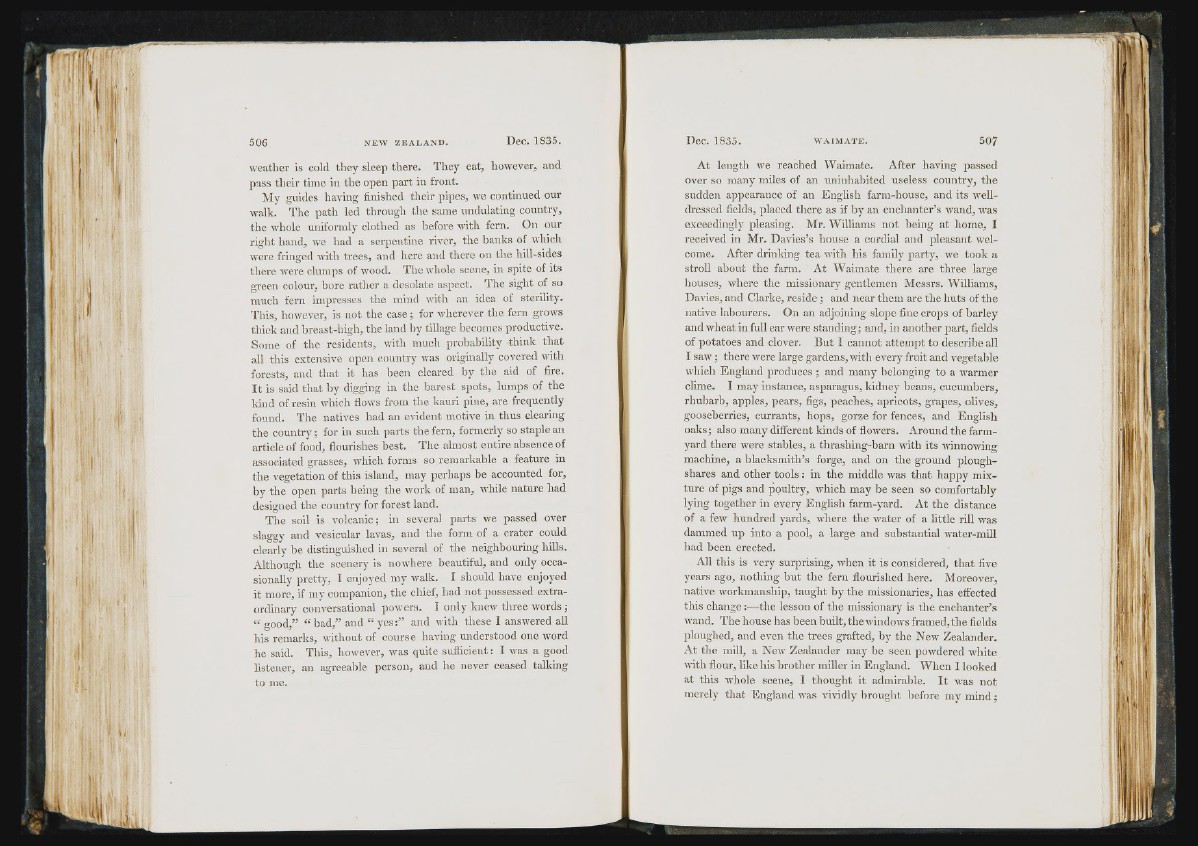
rnmmim i i i i '
1 .
'ft
!:; 1 T
fi l l
506 N E W Z E A L A N D . Dec. 1835.
weather is cold they sleep tliere. They eat, however, and
pass their time in the open part in front.
My guides having finished their pipes, we continued our
walk. The path led through the same undulating country,
the whole uniformly clothed as before with fern. On our
right hand, we had a serpentine river, the banks of which
were fringed with trees, and here and there on the hill-sides
there were clumps of wood. The whole scene, in spite of its
green colour, bore rather a desolate aspect. The sight of so
much fern impresses the mind with an idea of sterility.
This, however, is not the case; for wherever the fern grows
thick and breast-high, the land by tillage becomes productive.
Some of the residents, with much probability think that
all this extensive open country was originally covered with
forests, and that it has been cleared by the aid of fire.
I t is said that by digging in the barest spots, lumps of the
kind of resin which flows from the kauri pine, are frequently
found. The natives had an evident motive in thus clearing
the country; for in such parts the fern, formerly so staple an
article of food, flourishes best. The almost entire absence of
associated grasses, which forms so remarkable a feature in
the vegetation of this island, may perhaps he accounted for,
by the open parts being the work of man, while nature had
designed the country for forest land.
The soil is volcanic; in several parts we passed over
slaggy and vesicular lavas, and the form of a crater could
clearly be distinguished in several of the neighbouring hills.
Although the scenery is nowhere beautiful, and only occasionally
pretty, I enjoyed my walk. I should have enjoyed
it more, if my companion, the chief, had not possessed extraordinary
conversational powers. I only knew three words ;
“ good,” “ bad,” and “ yes:” and with these I answered all
his remarks, without of course having understood one word
he said. This, however, was quite sufficient: I was a good
listener, an agreeable person, and he never ceased talking
to me.
I
Dec. 1835. W A IM A T E . 507
At length we reached Waimate. After having passed
over so many miles of an uninhabited useless country, the
sudden appearance of an English farm-house, and its weU-
dressed fields, placed there as if by an enchanter’s wand, was
exceedingly pleasing. Mr. Williams not being at home, I
received in Mr. Davies’s house a cordial and pleasant welcome.
After drinking tea with his family party, we took a
stroll about the farm. At Waimate there are three large
houses, where the missionary gentlemen Messrs. Williams,
Davies, and Clarke, reside ; and near them are the huts of the
native labourers. On an adjoining slope fine crops of barley
and wheat in full ear were standing; and, in another part, fields
of potatoes and clover. But I cannot attempt to describe all
I saw; there were large gardens, with every fruit and vegetable
which England produces ; and many belonging to a warmer
clime. I may instance, asparagus, kidney beans, cucumbers,
rhubarb, apples, pears, figs, peaches, apricots, grapes, olives,
gooseberries, currants, hops, gorze for fences, and English
oaks; also many different kinds of flowers. Around the farmyard
there were stables, a thrashing-barn with its winnowing
machine, a blacksmith’s forge, and on the ground ploughshares
and other to o ls: in the middle was that happy mixture
of pigs and poultry, which may be seen so comfortably
lying together in every English farm-yard. At the distance
of a few hundred yards, where the water of a little rill was
dammed up into a pool, a large and substantial water-mill
had been erected.
All this is very surprising, when it is considered, that five
years ago, nothing but the fern flourished here. Moreover,
native workmanship, taught by the missionaries, has effected
this change :—the lesson of the missionaiy is the enchanter’s
wand. The house has been built, the windows framed, the fields
ploughed, and even the trees grafted, by the New Zealander.
At the mill, a New Zealander may be seen powdered white
with flour, like his brother miller in England. When I looked
at this whole scene, I thought it admirable. It was not
merely that England was vividly brought before my mind ;